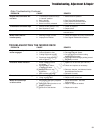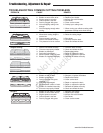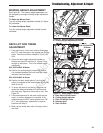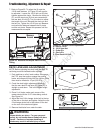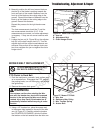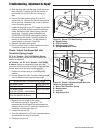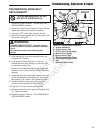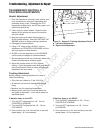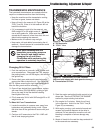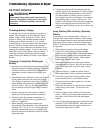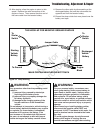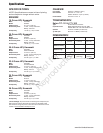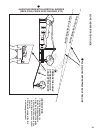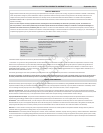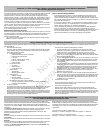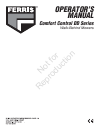
39
Troubleshooting, Adjustment & Repair
TRANSMISSION MAINTENANCE
The hydrostatic transmissions are sealed units that
require no maintenance other than the following.
• Keep the machine and the transmission cooling
fins clear or grass, leaves and debris.
• Keep oil level in the reservoir (A, Figure 32) at the
“FULL” line (B). Extra oil in the reservoir will not
benefit the machine.
• If it is necessary to add oil to the reservoir, use
SAE straight 20 or 30 weight motor oil. DO NOT
use a multi-grade oils. Make sure the area
around the oil reservoir is free from dust, dirt and
debris before opening the reservoir.
• Make sure the oil reservoir cap are tight.
• Keep water, dirt and debris from entering the oil
reservoir. A small amount of a contaminant could
damage the transmissions.
Changing Oil & Filters
1. Park the machine on a smooth, level surface such
as a concrete floor. Disengage the PTO, engage
the parking brake, turn off the engine, and remove
the ignition key.
2. Place a drain pan under each transmission and
remove the filters to drain the oil. See Figure 33.
NOTE: Before removing the right hand transmission
filter the filter guard must be removed.
3. Once oil has drained from transmissions, replace
with new filters (P/N 5021068X1), placing a light
film on the seal of the filter before installing.
Hand-tighten filter only.
4. Fill oil reservoirs 3/4 full with SAE straight 20 or 30
weight motor oil.
To Bleed Air From Transmissions
1. Locate the machine in a secure area, away from
bystanders and preferably facing a wall. Raise
the drive tires off the ground and secure with jack
stands.
2. Continue to fill reservoirs to the FULL LINE until
the oil level stops going down.
Figure 32. Oil Reservoirs
A. Oil Reservoirs
B. “FULL” Line
Figure 33. Transmission Oil Filter Location
(left-hand side shown with deck guard cut away.)
A. Transmission Oil Filter
Make sure transmissions and
immediate surrounding areas are
free from dirt and debris before
changing the oil and filters.
Cleanliness while performing this
operation is extremely important.
3. Start the engine and adjust throttle control to just
above idle. See the STARTING THE ENGINE
section for proper starting instructions.
4. Run engine for 5 minutes. Watch the oil level
in the reservoirs. Add oil to the “FULL” line (B,
Figure 32) as necessary.
5. With engine running, cycle controls forward and
reverse until positive response to the drive is
achieved. Do not attempt to move the unit until
bleeding is complete or serious damage may
occur.
6. Watch oil levels for the next few days and add oil
to the reservoirs as necessary.
B
A
A
Not for
Reproduction



